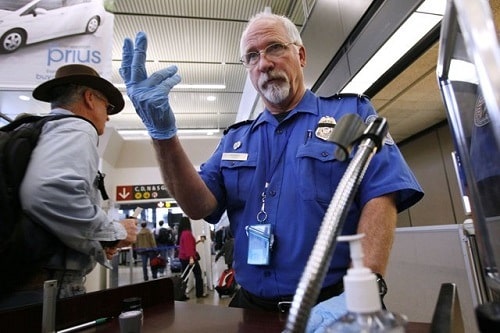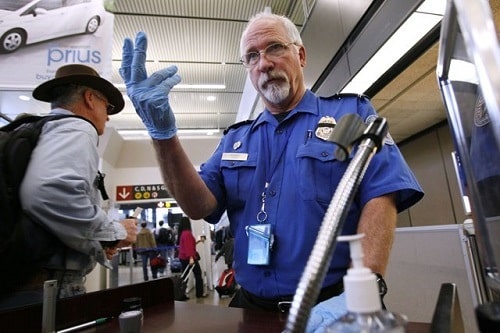Airport security or Gitmo? Transportation security requires competence not sexual assault.
The Transportation Security Administration finally obeyed a 2011 federal court order March 3 and issued a 157 page Federal Register notice justifying its controversial full-body scanners and other checkpoint procedures. TSA’s notice ignored the fact that the “nudie” scanners are utterly unreliable; TSA failed to detect 95% of weapons and mock bombs that Inspector General testers smuggled past them last year while the agency continues to mislead the public about its heavy-handed treatment of travelers.
The Federal Register notice is full of soothing pablum about how travelers have no reason to fear the TSA, declaring that “passengers can obtain information before they leave for the airport on what items are prohibited.” But it neglects to mention that TSA can invoke ludicrous pretexts to treat innocent travelers as suspicious terrorist suspects.
Flying home from Portland, Ore., on Thanksgiving morning, I had a too-close encounter with TSA agents that spurred me to file a Freedom of Information Act request. On March 5, I finally received a bevy of TSA documents and video footage with a grope-by-grope timeline.
As a silent assertion of my rights, I opted out that morning from passing through the “nudie” full-body scanners. A TSA agent instead did a vigorous pat-down and then, after running his glove through an explosive trace detector (ETD), announced that I showed a positive alert for explosives. He did not know what type of explosive was detected and refused to disclose how often that machine spewed false alarms. Regardless, I was told I would have to undergo a an additional special pat-down to resolve the explosive alert. I was marched off by three TSA agents to a closed room. TSA states that “a companion of his or her choosing may accompany the passenger” but I was never notified of that right.
TSA disclosed exhaustive video coverage of my every movement in the Portland airport, even detailing which chair I chose after getting a Starbucks coffee. But there is a tell-tale gap. The video timeline notes “7:50:29 group arrives at Private Security room. 7:50:55. Door Closes. 7:57:28 Door Opens.” The seven-minute gap in the recording is where travelers’ rights vanish.
TSA’s power is effectively unlimited behind closed doors. The lead Transportation Security officer (LTSO) proceeded to carry out a far more aggressive patdown, tugging on my shirt as if he thought it was a tear-away football jersey. The procedure was only mildly aggravating until he jammed his palm into my groin three times. Perhaps that pointless procedure was retribution for opting-out or my scoffing at their security theater.
The post-incident report by one agent in that room noted that “the pax (passenger) was asking about the false-alarm-rate of our machines. The LTSO explained several times that ‘there are things that the average person comes in contact with every day’” that trigger alerts. The agents talked as if, because innocuous items set off the detectors, TSA’s groin-jamming is also innocuous.
I had used hand sanitizer that morning — something which is notorious for spawning TSA explosive alerts. Aarin McCarthy, TSA’s Customer Service Support Specialist at the Portland airport, noted in an internal email a week after I was searched that “I have received several other complaints lately about ETD testing and ‘false positives’” at the Portland airport.
Millions of airline passengers use hand sanitizer every week. Yet, TSA entitles itself to treat anyone who triggers false alerts more intrusively than the Pentagon was allowed in 2013 to treat accused enemy combatants held at Guantanamo Bay. A Justice Department lawyer, Edward Himmelfarb, told a federal judge that intrusive searches at Gitmo were no big deal: “It’s basically like a TSA … supplemental search … The genital area is touched through the clothing with a flat hand, the way the TSA does.” Federal judge Royce Lamberth ordered “the military to stop touching the groins of detainees,” the New York Times reported.
An appeals court overturned his decision but not before Himmelfarb sought to recant his TSA remarks because of “sensitive security information.” But his revelations were no secret to scores of thousands of people who have been victimized by TSA supplemental searches. TSA’s pelvic pawing is especially traumatic to survivors of sexual assaults or those who have had surgery in that area. A TSA agent vigorously patted down the entire body of a 10-year-old girl in the Raleigh-Durham airport in December after she triggered a false explosive alert; her father Kevin Payne’s video of the groping sparked a national uproar.
When TSA published a preliminary notice in 2013 of its new regulation on scanners, it received more than 5,000 comments overwhelmingly opposed to its screening policy. TSA’s response last week noted the profusion of complaints about its privacy and civil liberties violations but brushed off such concerns as if they were narrow-minded quibbles. But Homeland Security Inspector General John Roth told Congress in November that the results of the most recent testing of TSA checkpoints at eight airports “were disappointing and troubling” and “we found layers of security simply missing.” Senate Homeland Security Committee chairman Ron Johnson, after seeing confidential reports on the dismal failure of full-body scanners, suggested last August that passengers should be required to go through old-fashioned metal detectors after passing through the new scanners.
TSA’s Federal Register self-vindication omitted any mention of treating American travelers like Gitmo detainees. But even 44,000 words of bureaucratic wind cannot blow away the fact that TSA continues to be far more effective at hassling travelers than at assuring airline safety.
James Bovard is the author most recently of Public Policy Hooligan.
Re-printed with permission from author’s blog.


